Comprehensive Report: Health and Social Care Policy and Ethics
VerifiedAdded on 2023/01/05
|12
|3796
|2
Report
AI Summary
This report delves into the crucial aspects of policy and ethical practice within the health and social care sector. It begins by examining the roles of the legislature, judiciary, and executive in shaping the legal and policy landscape, including an overview of civil and criminal law, and the evolution of English law. The report summarizes key features of legislation, codes of practice, statutory guidance, and both organizational and national policies. It provides a detailed analysis of how ethics inform care, health, and support service practices, emphasizing the importance of ethical codes of conduct for healthcare practitioners. The report also explores the relationships between legislation, direct relevance, and national policy, comparing national, organizational, and local policies against national professional standards. Furthermore, it discusses the influence of national and international human rights law on equal and fair treatment within healthcare settings. Finally, the report concludes with a reflection on the importance of person-centered values and care values in achieving positive care outcomes.
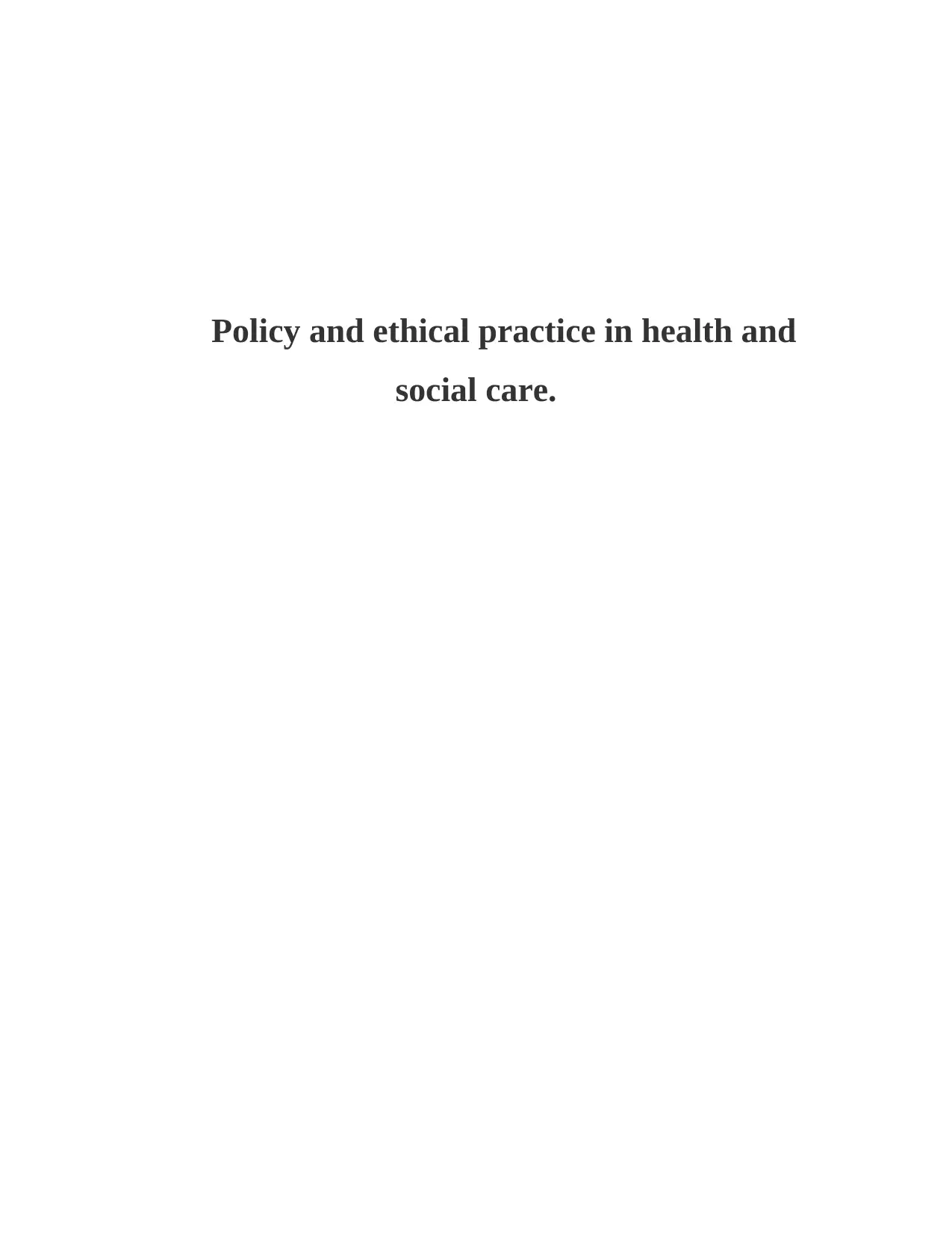
Policy and ethical practice in health and
social care.
social care.
Paraphrase This Document
Need a fresh take? Get an instant paraphrase of this document with our AI Paraphraser
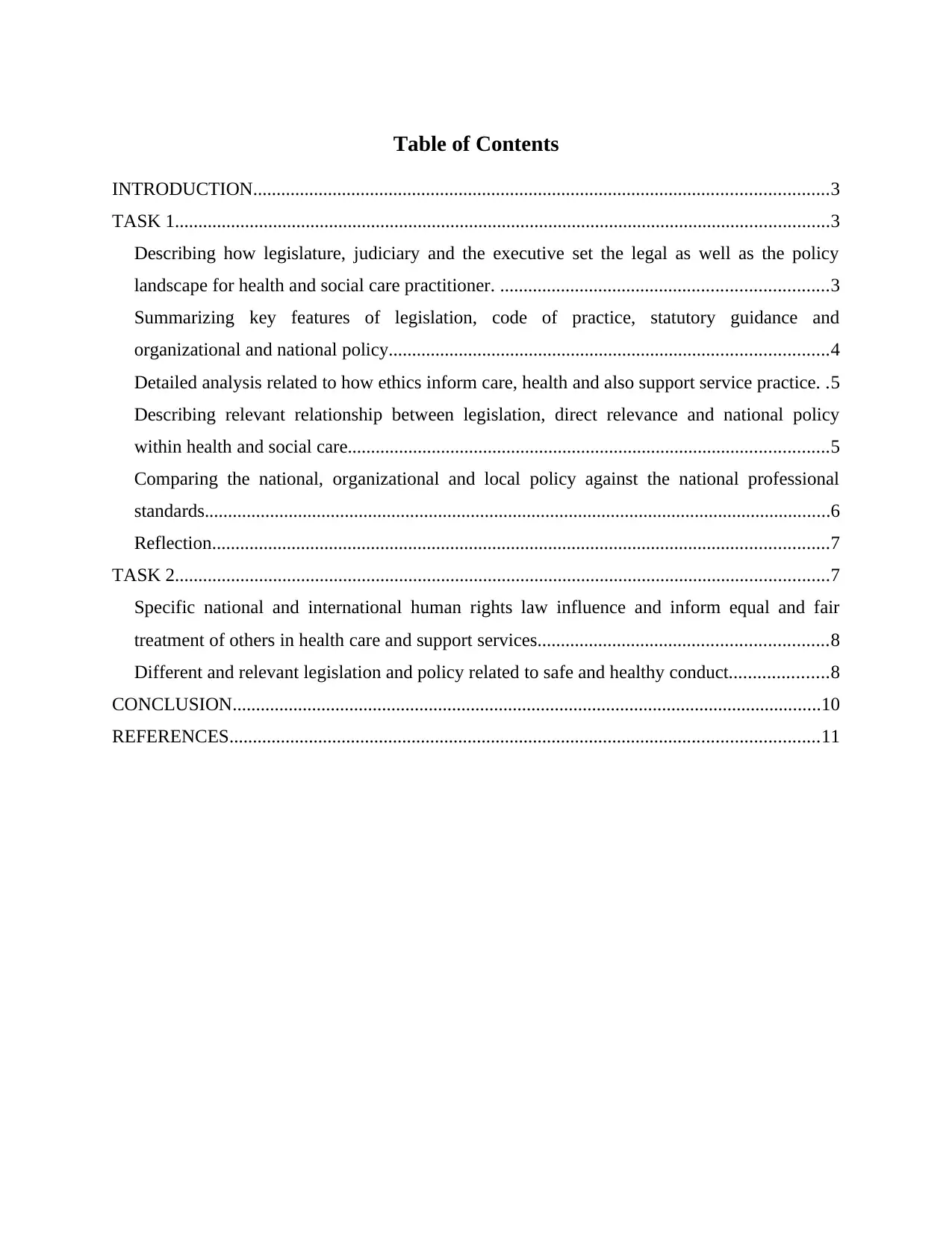
Table of Contents
INTRODUCTION...........................................................................................................................3
TASK 1............................................................................................................................................3
Describing how legislature, judiciary and the executive set the legal as well as the policy
landscape for health and social care practitioner. ......................................................................3
Summarizing key features of legislation, code of practice, statutory guidance and
organizational and national policy..............................................................................................4
Detailed analysis related to how ethics inform care, health and also support service practice. .5
Describing relevant relationship between legislation, direct relevance and national policy
within health and social care.......................................................................................................5
Comparing the national, organizational and local policy against the national professional
standards......................................................................................................................................6
Reflection....................................................................................................................................7
TASK 2............................................................................................................................................7
Specific national and international human rights law influence and inform equal and fair
treatment of others in health care and support services..............................................................8
Different and relevant legislation and policy related to safe and healthy conduct.....................8
CONCLUSION..............................................................................................................................10
REFERENCES..............................................................................................................................11
INTRODUCTION...........................................................................................................................3
TASK 1............................................................................................................................................3
Describing how legislature, judiciary and the executive set the legal as well as the policy
landscape for health and social care practitioner. ......................................................................3
Summarizing key features of legislation, code of practice, statutory guidance and
organizational and national policy..............................................................................................4
Detailed analysis related to how ethics inform care, health and also support service practice. .5
Describing relevant relationship between legislation, direct relevance and national policy
within health and social care.......................................................................................................5
Comparing the national, organizational and local policy against the national professional
standards......................................................................................................................................6
Reflection....................................................................................................................................7
TASK 2............................................................................................................................................7
Specific national and international human rights law influence and inform equal and fair
treatment of others in health care and support services..............................................................8
Different and relevant legislation and policy related to safe and healthy conduct.....................8
CONCLUSION..............................................................................................................................10
REFERENCES..............................................................................................................................11
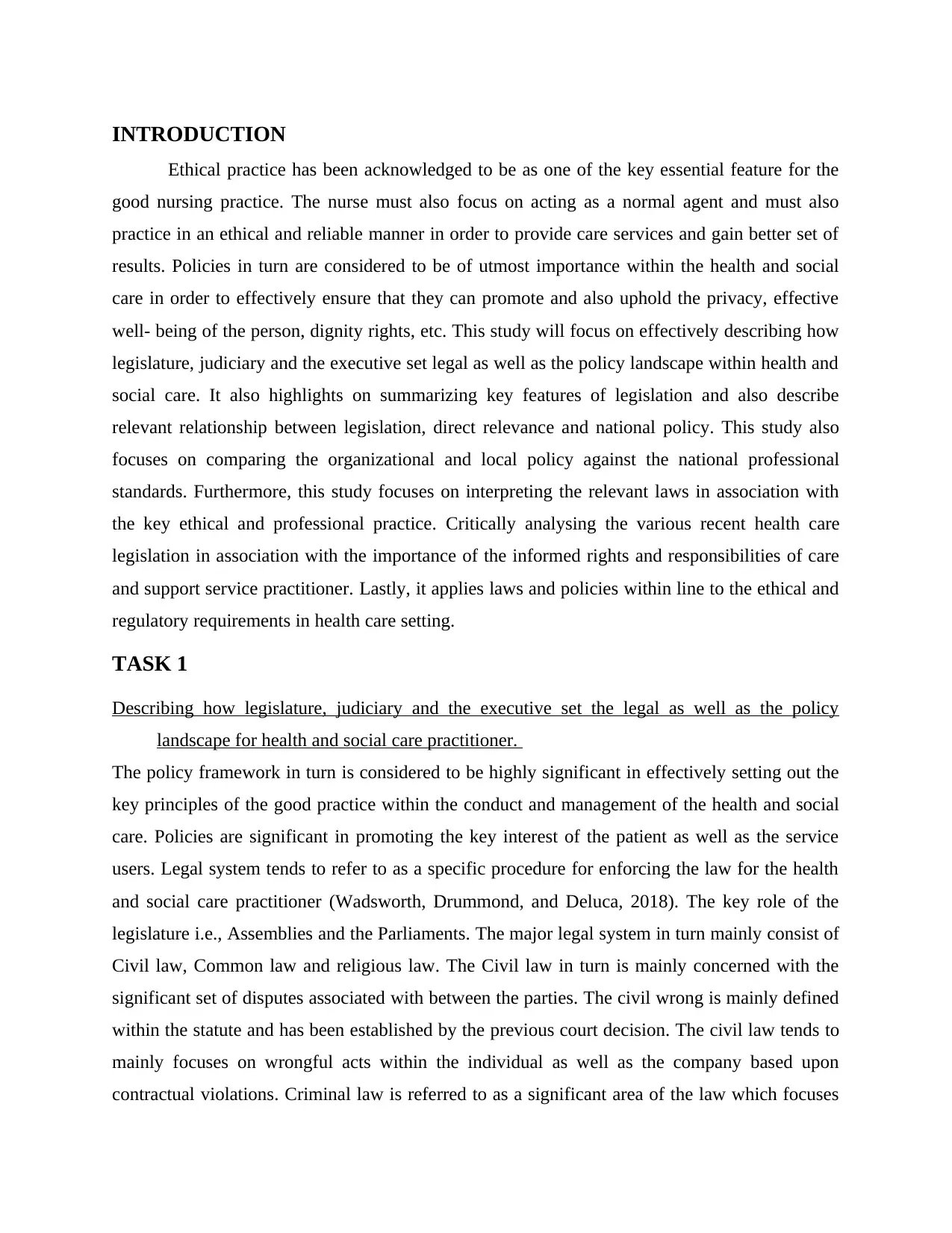
INTRODUCTION
Ethical practice has been acknowledged to be as one of the key essential feature for the
good nursing practice. The nurse must also focus on acting as a normal agent and must also
practice in an ethical and reliable manner in order to provide care services and gain better set of
results. Policies in turn are considered to be of utmost importance within the health and social
care in order to effectively ensure that they can promote and also uphold the privacy, effective
well- being of the person, dignity rights, etc. This study will focus on effectively describing how
legislature, judiciary and the executive set legal as well as the policy landscape within health and
social care. It also highlights on summarizing key features of legislation and also describe
relevant relationship between legislation, direct relevance and national policy. This study also
focuses on comparing the organizational and local policy against the national professional
standards. Furthermore, this study focuses on interpreting the relevant laws in association with
the key ethical and professional practice. Critically analysing the various recent health care
legislation in association with the importance of the informed rights and responsibilities of care
and support service practitioner. Lastly, it applies laws and policies within line to the ethical and
regulatory requirements in health care setting.
TASK 1
Describing how legislature, judiciary and the executive set the legal as well as the policy
landscape for health and social care practitioner.
The policy framework in turn is considered to be highly significant in effectively setting out the
key principles of the good practice within the conduct and management of the health and social
care. Policies are significant in promoting the key interest of the patient as well as the service
users. Legal system tends to refer to as a specific procedure for enforcing the law for the health
and social care practitioner (Wadsworth, Drummond, and Deluca, 2018). The key role of the
legislature i.e., Assemblies and the Parliaments. The major legal system in turn mainly consist of
Civil law, Common law and religious law. The Civil law in turn is mainly concerned with the
significant set of disputes associated with between the parties. The civil wrong is mainly defined
within the statute and has been established by the previous court decision. The civil law tends to
mainly focuses on wrongful acts within the individual as well as the company based upon
contractual violations. Criminal law is referred to as a significant area of the law which focuses
Ethical practice has been acknowledged to be as one of the key essential feature for the
good nursing practice. The nurse must also focus on acting as a normal agent and must also
practice in an ethical and reliable manner in order to provide care services and gain better set of
results. Policies in turn are considered to be of utmost importance within the health and social
care in order to effectively ensure that they can promote and also uphold the privacy, effective
well- being of the person, dignity rights, etc. This study will focus on effectively describing how
legislature, judiciary and the executive set legal as well as the policy landscape within health and
social care. It also highlights on summarizing key features of legislation and also describe
relevant relationship between legislation, direct relevance and national policy. This study also
focuses on comparing the organizational and local policy against the national professional
standards. Furthermore, this study focuses on interpreting the relevant laws in association with
the key ethical and professional practice. Critically analysing the various recent health care
legislation in association with the importance of the informed rights and responsibilities of care
and support service practitioner. Lastly, it applies laws and policies within line to the ethical and
regulatory requirements in health care setting.
TASK 1
Describing how legislature, judiciary and the executive set the legal as well as the policy
landscape for health and social care practitioner.
The policy framework in turn is considered to be highly significant in effectively setting out the
key principles of the good practice within the conduct and management of the health and social
care. Policies are significant in promoting the key interest of the patient as well as the service
users. Legal system tends to refer to as a specific procedure for enforcing the law for the health
and social care practitioner (Wadsworth, Drummond, and Deluca, 2018). The key role of the
legislature i.e., Assemblies and the Parliaments. The major legal system in turn mainly consist of
Civil law, Common law and religious law. The Civil law in turn is mainly concerned with the
significant set of disputes associated with between the parties. The civil wrong is mainly defined
within the statute and has been established by the previous court decision. The civil law tends to
mainly focuses on wrongful acts within the individual as well as the company based upon
contractual violations. Criminal law is referred to as a significant area of the law which focuses
⊘ This is a preview!⊘
Do you want full access?
Subscribe today to unlock all pages.

Trusted by 1+ million students worldwide
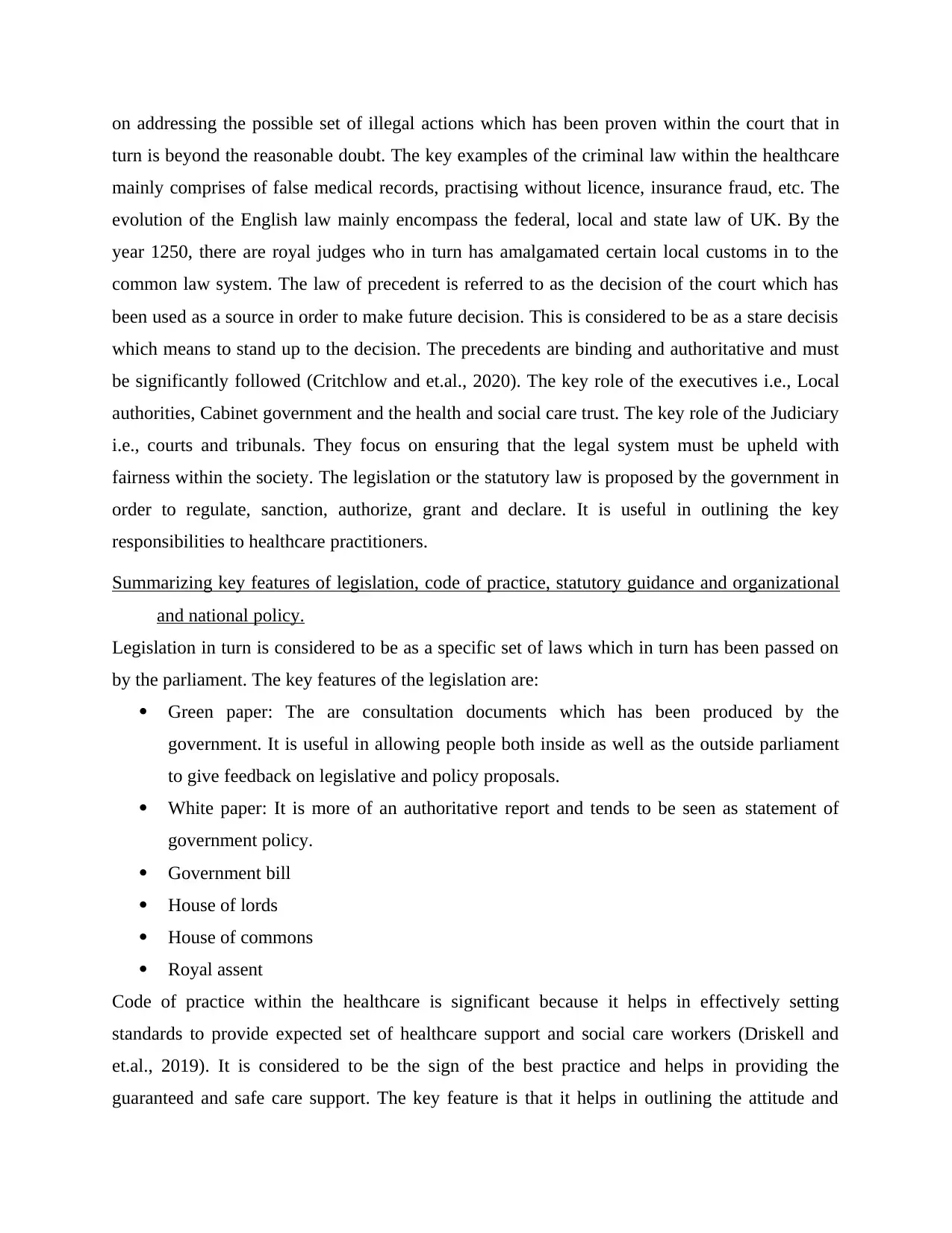
on addressing the possible set of illegal actions which has been proven within the court that in
turn is beyond the reasonable doubt. The key examples of the criminal law within the healthcare
mainly comprises of false medical records, practising without licence, insurance fraud, etc. The
evolution of the English law mainly encompass the federal, local and state law of UK. By the
year 1250, there are royal judges who in turn has amalgamated certain local customs in to the
common law system. The law of precedent is referred to as the decision of the court which has
been used as a source in order to make future decision. This is considered to be as a stare decisis
which means to stand up to the decision. The precedents are binding and authoritative and must
be significantly followed (Critchlow and et.al., 2020). The key role of the executives i.e., Local
authorities, Cabinet government and the health and social care trust. The key role of the Judiciary
i.e., courts and tribunals. They focus on ensuring that the legal system must be upheld with
fairness within the society. The legislation or the statutory law is proposed by the government in
order to regulate, sanction, authorize, grant and declare. It is useful in outlining the key
responsibilities to healthcare practitioners.
Summarizing key features of legislation, code of practice, statutory guidance and organizational
and national policy.
Legislation in turn is considered to be as a specific set of laws which in turn has been passed on
by the parliament. The key features of the legislation are:
Green paper: The are consultation documents which has been produced by the
government. It is useful in allowing people both inside as well as the outside parliament
to give feedback on legislative and policy proposals.
White paper: It is more of an authoritative report and tends to be seen as statement of
government policy.
Government bill
House of lords
House of commons
Royal assent
Code of practice within the healthcare is significant because it helps in effectively setting
standards to provide expected set of healthcare support and social care workers (Driskell and
et.al., 2019). It is considered to be the sign of the best practice and helps in providing the
guaranteed and safe care support. The key feature is that it helps in outlining the attitude and
turn is beyond the reasonable doubt. The key examples of the criminal law within the healthcare
mainly comprises of false medical records, practising without licence, insurance fraud, etc. The
evolution of the English law mainly encompass the federal, local and state law of UK. By the
year 1250, there are royal judges who in turn has amalgamated certain local customs in to the
common law system. The law of precedent is referred to as the decision of the court which has
been used as a source in order to make future decision. This is considered to be as a stare decisis
which means to stand up to the decision. The precedents are binding and authoritative and must
be significantly followed (Critchlow and et.al., 2020). The key role of the executives i.e., Local
authorities, Cabinet government and the health and social care trust. The key role of the Judiciary
i.e., courts and tribunals. They focus on ensuring that the legal system must be upheld with
fairness within the society. The legislation or the statutory law is proposed by the government in
order to regulate, sanction, authorize, grant and declare. It is useful in outlining the key
responsibilities to healthcare practitioners.
Summarizing key features of legislation, code of practice, statutory guidance and organizational
and national policy.
Legislation in turn is considered to be as a specific set of laws which in turn has been passed on
by the parliament. The key features of the legislation are:
Green paper: The are consultation documents which has been produced by the
government. It is useful in allowing people both inside as well as the outside parliament
to give feedback on legislative and policy proposals.
White paper: It is more of an authoritative report and tends to be seen as statement of
government policy.
Government bill
House of lords
House of commons
Royal assent
Code of practice within the healthcare is significant because it helps in effectively setting
standards to provide expected set of healthcare support and social care workers (Driskell and
et.al., 2019). It is considered to be the sign of the best practice and helps in providing the
guaranteed and safe care support. The key feature is that it helps in outlining the attitude and
Paraphrase This Document
Need a fresh take? Get an instant paraphrase of this document with our AI Paraphraser
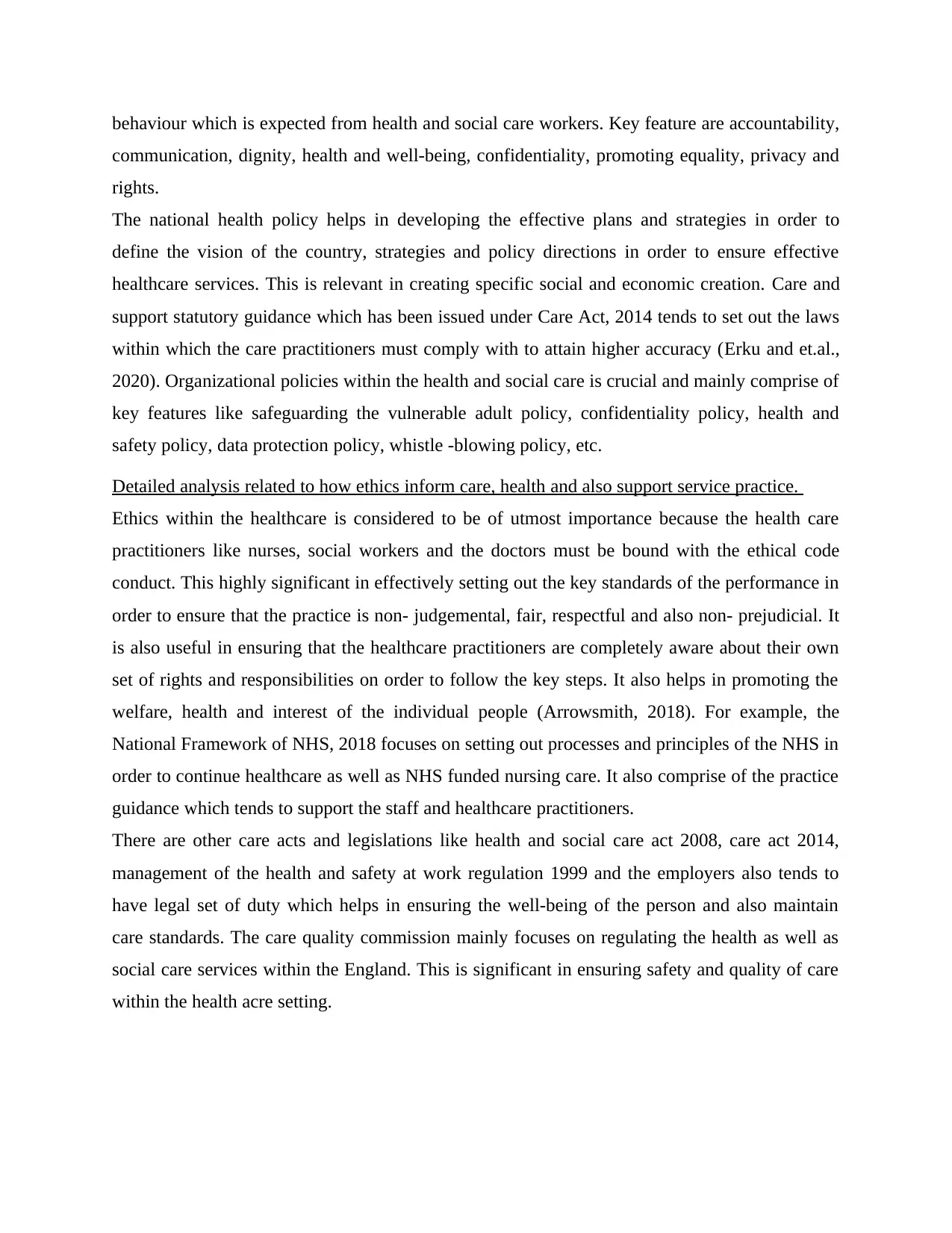
behaviour which is expected from health and social care workers. Key feature are accountability,
communication, dignity, health and well-being, confidentiality, promoting equality, privacy and
rights.
The national health policy helps in developing the effective plans and strategies in order to
define the vision of the country, strategies and policy directions in order to ensure effective
healthcare services. This is relevant in creating specific social and economic creation. Care and
support statutory guidance which has been issued under Care Act, 2014 tends to set out the laws
within which the care practitioners must comply with to attain higher accuracy (Erku and et.al.,
2020). Organizational policies within the health and social care is crucial and mainly comprise of
key features like safeguarding the vulnerable adult policy, confidentiality policy, health and
safety policy, data protection policy, whistle -blowing policy, etc.
Detailed analysis related to how ethics inform care, health and also support service practice.
Ethics within the healthcare is considered to be of utmost importance because the health care
practitioners like nurses, social workers and the doctors must be bound with the ethical code
conduct. This highly significant in effectively setting out the key standards of the performance in
order to ensure that the practice is non- judgemental, fair, respectful and also non- prejudicial. It
is also useful in ensuring that the healthcare practitioners are completely aware about their own
set of rights and responsibilities on order to follow the key steps. It also helps in promoting the
welfare, health and interest of the individual people (Arrowsmith, 2018). For example, the
National Framework of NHS, 2018 focuses on setting out processes and principles of the NHS in
order to continue healthcare as well as NHS funded nursing care. It also comprise of the practice
guidance which tends to support the staff and healthcare practitioners.
There are other care acts and legislations like health and social care act 2008, care act 2014,
management of the health and safety at work regulation 1999 and the employers also tends to
have legal set of duty which helps in ensuring the well-being of the person and also maintain
care standards. The care quality commission mainly focuses on regulating the health as well as
social care services within the England. This is significant in ensuring safety and quality of care
within the health acre setting.
communication, dignity, health and well-being, confidentiality, promoting equality, privacy and
rights.
The national health policy helps in developing the effective plans and strategies in order to
define the vision of the country, strategies and policy directions in order to ensure effective
healthcare services. This is relevant in creating specific social and economic creation. Care and
support statutory guidance which has been issued under Care Act, 2014 tends to set out the laws
within which the care practitioners must comply with to attain higher accuracy (Erku and et.al.,
2020). Organizational policies within the health and social care is crucial and mainly comprise of
key features like safeguarding the vulnerable adult policy, confidentiality policy, health and
safety policy, data protection policy, whistle -blowing policy, etc.
Detailed analysis related to how ethics inform care, health and also support service practice.
Ethics within the healthcare is considered to be of utmost importance because the health care
practitioners like nurses, social workers and the doctors must be bound with the ethical code
conduct. This highly significant in effectively setting out the key standards of the performance in
order to ensure that the practice is non- judgemental, fair, respectful and also non- prejudicial. It
is also useful in ensuring that the healthcare practitioners are completely aware about their own
set of rights and responsibilities on order to follow the key steps. It also helps in promoting the
welfare, health and interest of the individual people (Arrowsmith, 2018). For example, the
National Framework of NHS, 2018 focuses on setting out processes and principles of the NHS in
order to continue healthcare as well as NHS funded nursing care. It also comprise of the practice
guidance which tends to support the staff and healthcare practitioners.
There are other care acts and legislations like health and social care act 2008, care act 2014,
management of the health and safety at work regulation 1999 and the employers also tends to
have legal set of duty which helps in ensuring the well-being of the person and also maintain
care standards. The care quality commission mainly focuses on regulating the health as well as
social care services within the England. This is significant in ensuring safety and quality of care
within the health acre setting.
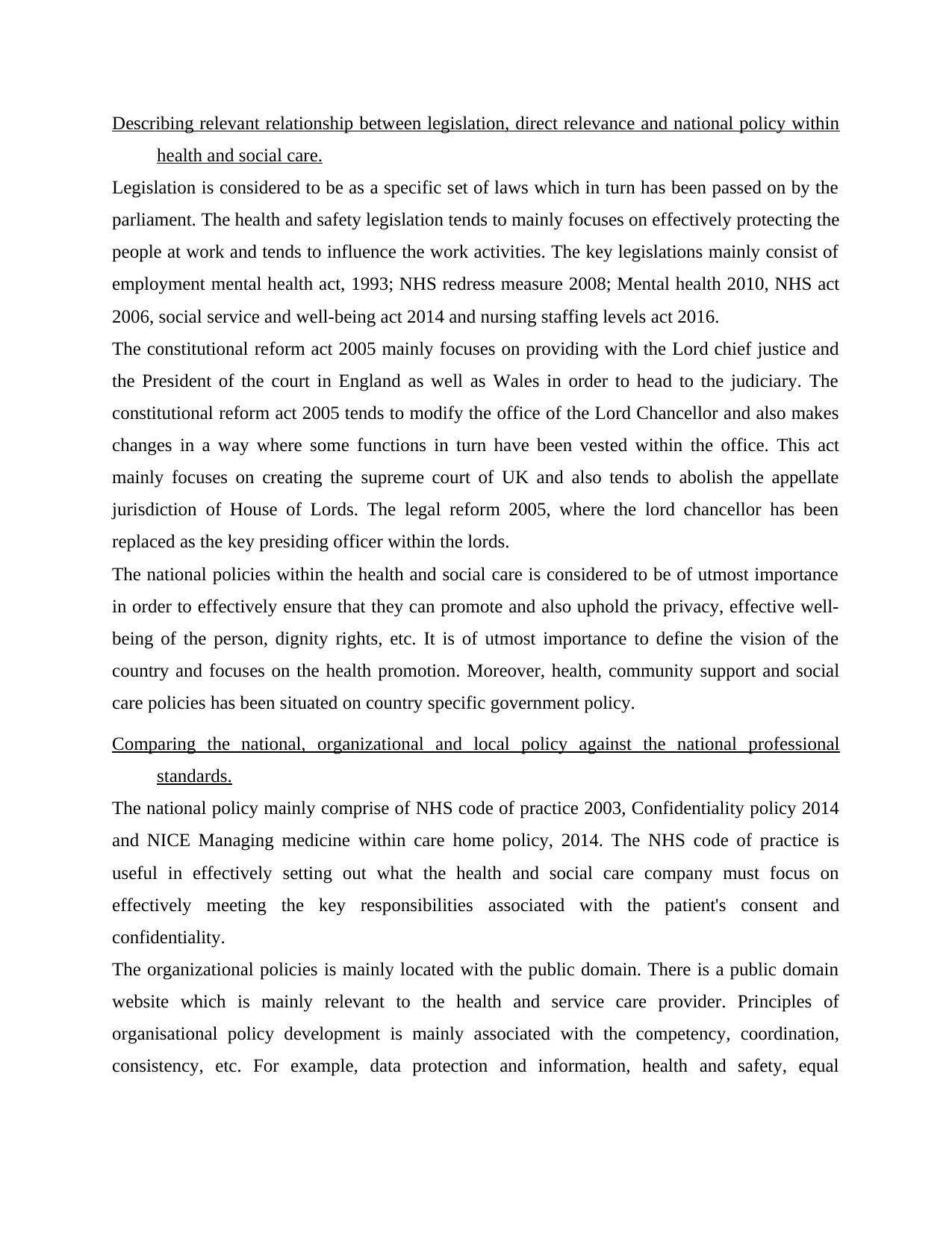
Describing relevant relationship between legislation, direct relevance and national policy within
health and social care.
Legislation is considered to be as a specific set of laws which in turn has been passed on by the
parliament. The health and safety legislation tends to mainly focuses on effectively protecting the
people at work and tends to influence the work activities. The key legislations mainly consist of
employment mental health act, 1993; NHS redress measure 2008; Mental health 2010, NHS act
2006, social service and well-being act 2014 and nursing staffing levels act 2016.
The constitutional reform act 2005 mainly focuses on providing with the Lord chief justice and
the President of the court in England as well as Wales in order to head to the judiciary. The
constitutional reform act 2005 tends to modify the office of the Lord Chancellor and also makes
changes in a way where some functions in turn have been vested within the office. This act
mainly focuses on creating the supreme court of UK and also tends to abolish the appellate
jurisdiction of House of Lords. The legal reform 2005, where the lord chancellor has been
replaced as the key presiding officer within the lords.
The national policies within the health and social care is considered to be of utmost importance
in order to effectively ensure that they can promote and also uphold the privacy, effective well-
being of the person, dignity rights, etc. It is of utmost importance to define the vision of the
country and focuses on the health promotion. Moreover, health, community support and social
care policies has been situated on country specific government policy.
Comparing the national, organizational and local policy against the national professional
standards.
The national policy mainly comprise of NHS code of practice 2003, Confidentiality policy 2014
and NICE Managing medicine within care home policy, 2014. The NHS code of practice is
useful in effectively setting out what the health and social care company must focus on
effectively meeting the key responsibilities associated with the patient's consent and
confidentiality.
The organizational policies is mainly located with the public domain. There is a public domain
website which is mainly relevant to the health and service care provider. Principles of
organisational policy development is mainly associated with the competency, coordination,
consistency, etc. For example, data protection and information, health and safety, equal
health and social care.
Legislation is considered to be as a specific set of laws which in turn has been passed on by the
parliament. The health and safety legislation tends to mainly focuses on effectively protecting the
people at work and tends to influence the work activities. The key legislations mainly consist of
employment mental health act, 1993; NHS redress measure 2008; Mental health 2010, NHS act
2006, social service and well-being act 2014 and nursing staffing levels act 2016.
The constitutional reform act 2005 mainly focuses on providing with the Lord chief justice and
the President of the court in England as well as Wales in order to head to the judiciary. The
constitutional reform act 2005 tends to modify the office of the Lord Chancellor and also makes
changes in a way where some functions in turn have been vested within the office. This act
mainly focuses on creating the supreme court of UK and also tends to abolish the appellate
jurisdiction of House of Lords. The legal reform 2005, where the lord chancellor has been
replaced as the key presiding officer within the lords.
The national policies within the health and social care is considered to be of utmost importance
in order to effectively ensure that they can promote and also uphold the privacy, effective well-
being of the person, dignity rights, etc. It is of utmost importance to define the vision of the
country and focuses on the health promotion. Moreover, health, community support and social
care policies has been situated on country specific government policy.
Comparing the national, organizational and local policy against the national professional
standards.
The national policy mainly comprise of NHS code of practice 2003, Confidentiality policy 2014
and NICE Managing medicine within care home policy, 2014. The NHS code of practice is
useful in effectively setting out what the health and social care company must focus on
effectively meeting the key responsibilities associated with the patient's consent and
confidentiality.
The organizational policies is mainly located with the public domain. There is a public domain
website which is mainly relevant to the health and service care provider. Principles of
organisational policy development is mainly associated with the competency, coordination,
consistency, etc. For example, data protection and information, health and safety, equal
⊘ This is a preview!⊘
Do you want full access?
Subscribe today to unlock all pages.

Trusted by 1+ million students worldwide
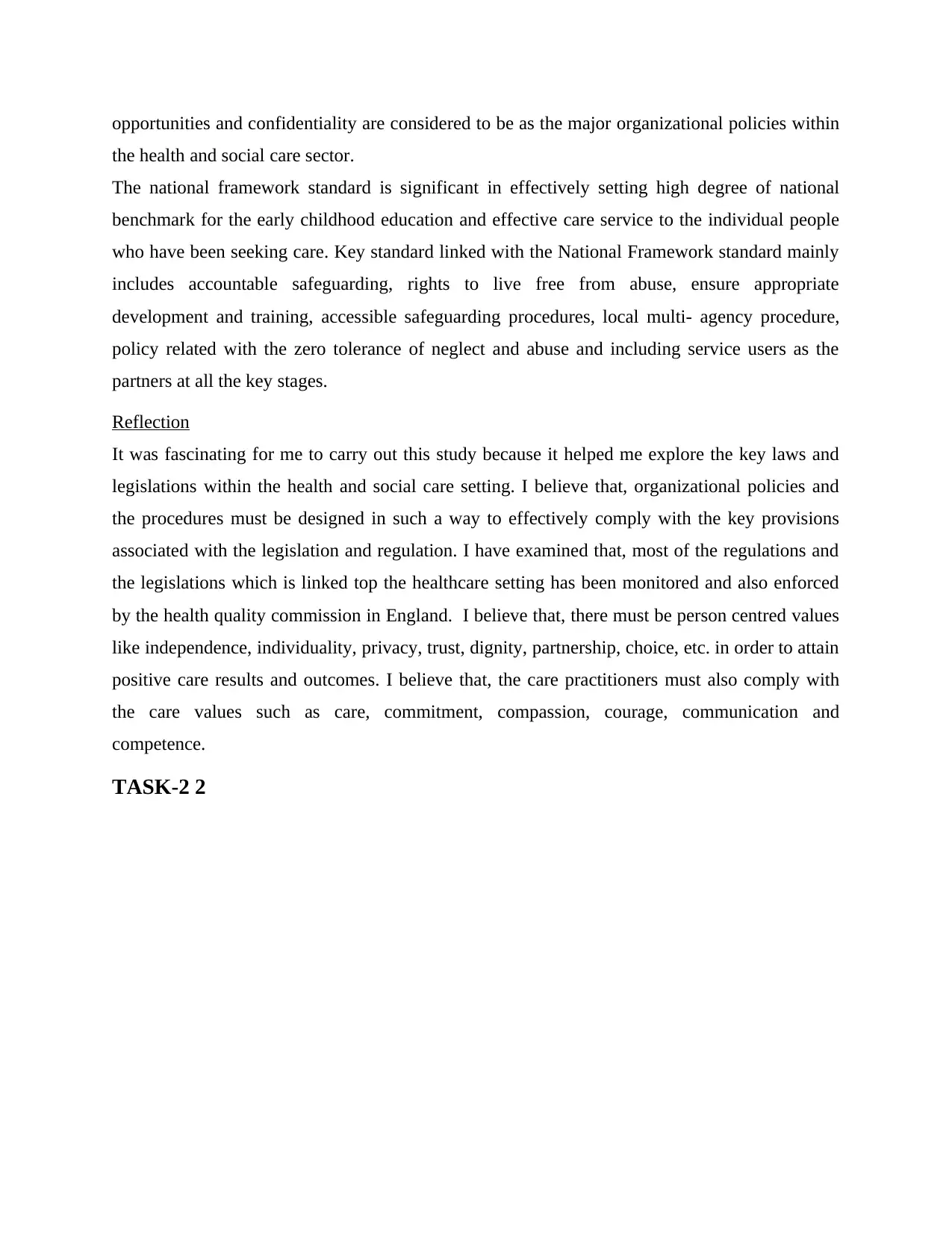
opportunities and confidentiality are considered to be as the major organizational policies within
the health and social care sector.
The national framework standard is significant in effectively setting high degree of national
benchmark for the early childhood education and effective care service to the individual people
who have been seeking care. Key standard linked with the National Framework standard mainly
includes accountable safeguarding, rights to live free from abuse, ensure appropriate
development and training, accessible safeguarding procedures, local multi- agency procedure,
policy related with the zero tolerance of neglect and abuse and including service users as the
partners at all the key stages.
Reflection
It was fascinating for me to carry out this study because it helped me explore the key laws and
legislations within the health and social care setting. I believe that, organizational policies and
the procedures must be designed in such a way to effectively comply with the key provisions
associated with the legislation and regulation. I have examined that, most of the regulations and
the legislations which is linked top the healthcare setting has been monitored and also enforced
by the health quality commission in England. I believe that, there must be person centred values
like independence, individuality, privacy, trust, dignity, partnership, choice, etc. in order to attain
positive care results and outcomes. I believe that, the care practitioners must also comply with
the care values such as care, commitment, compassion, courage, communication and
competence.
TASK-2 2
the health and social care sector.
The national framework standard is significant in effectively setting high degree of national
benchmark for the early childhood education and effective care service to the individual people
who have been seeking care. Key standard linked with the National Framework standard mainly
includes accountable safeguarding, rights to live free from abuse, ensure appropriate
development and training, accessible safeguarding procedures, local multi- agency procedure,
policy related with the zero tolerance of neglect and abuse and including service users as the
partners at all the key stages.
Reflection
It was fascinating for me to carry out this study because it helped me explore the key laws and
legislations within the health and social care setting. I believe that, organizational policies and
the procedures must be designed in such a way to effectively comply with the key provisions
associated with the legislation and regulation. I have examined that, most of the regulations and
the legislations which is linked top the healthcare setting has been monitored and also enforced
by the health quality commission in England. I believe that, there must be person centred values
like independence, individuality, privacy, trust, dignity, partnership, choice, etc. in order to attain
positive care results and outcomes. I believe that, the care practitioners must also comply with
the care values such as care, commitment, compassion, courage, communication and
competence.
TASK-2 2
Paraphrase This Document
Need a fresh take? Get an instant paraphrase of this document with our AI Paraphraser
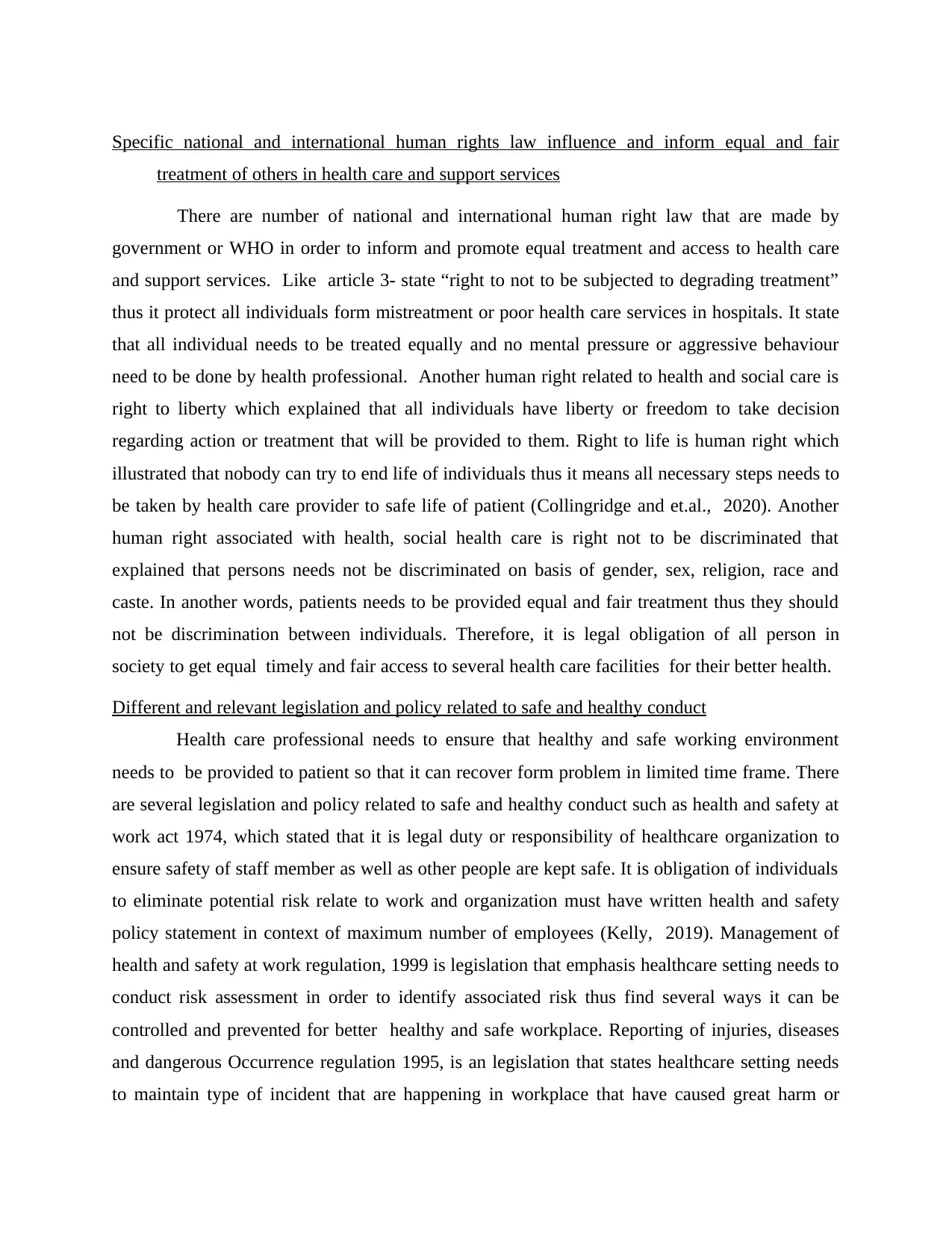
Specific national and international human rights law influence and inform equal and fair
treatment of others in health care and support services
There are number of national and international human right law that are made by
government or WHO in order to inform and promote equal treatment and access to health care
and support services. Like article 3- state “right to not to be subjected to degrading treatment”
thus it protect all individuals form mistreatment or poor health care services in hospitals. It state
that all individual needs to be treated equally and no mental pressure or aggressive behaviour
need to be done by health professional. Another human right related to health and social care is
right to liberty which explained that all individuals have liberty or freedom to take decision
regarding action or treatment that will be provided to them. Right to life is human right which
illustrated that nobody can try to end life of individuals thus it means all necessary steps needs to
be taken by health care provider to safe life of patient (Collingridge and et.al., 2020). Another
human right associated with health, social health care is right not to be discriminated that
explained that persons needs not be discriminated on basis of gender, sex, religion, race and
caste. In another words, patients needs to be provided equal and fair treatment thus they should
not be discrimination between individuals. Therefore, it is legal obligation of all person in
society to get equal timely and fair access to several health care facilities for their better health.
Different and relevant legislation and policy related to safe and healthy conduct
Health care professional needs to ensure that healthy and safe working environment
needs to be provided to patient so that it can recover form problem in limited time frame. There
are several legislation and policy related to safe and healthy conduct such as health and safety at
work act 1974, which stated that it is legal duty or responsibility of healthcare organization to
ensure safety of staff member as well as other people are kept safe. It is obligation of individuals
to eliminate potential risk relate to work and organization must have written health and safety
policy statement in context of maximum number of employees (Kelly, 2019). Management of
health and safety at work regulation, 1999 is legislation that emphasis healthcare setting needs to
conduct risk assessment in order to identify associated risk thus find several ways it can be
controlled and prevented for better healthy and safe workplace. Reporting of injuries, diseases
and dangerous Occurrence regulation 1995, is an legislation that states healthcare setting needs
to maintain type of incident that are happening in workplace that have caused great harm or
treatment of others in health care and support services
There are number of national and international human right law that are made by
government or WHO in order to inform and promote equal treatment and access to health care
and support services. Like article 3- state “right to not to be subjected to degrading treatment”
thus it protect all individuals form mistreatment or poor health care services in hospitals. It state
that all individual needs to be treated equally and no mental pressure or aggressive behaviour
need to be done by health professional. Another human right related to health and social care is
right to liberty which explained that all individuals have liberty or freedom to take decision
regarding action or treatment that will be provided to them. Right to life is human right which
illustrated that nobody can try to end life of individuals thus it means all necessary steps needs to
be taken by health care provider to safe life of patient (Collingridge and et.al., 2020). Another
human right associated with health, social health care is right not to be discriminated that
explained that persons needs not be discriminated on basis of gender, sex, religion, race and
caste. In another words, patients needs to be provided equal and fair treatment thus they should
not be discrimination between individuals. Therefore, it is legal obligation of all person in
society to get equal timely and fair access to several health care facilities for their better health.
Different and relevant legislation and policy related to safe and healthy conduct
Health care professional needs to ensure that healthy and safe working environment
needs to be provided to patient so that it can recover form problem in limited time frame. There
are several legislation and policy related to safe and healthy conduct such as health and safety at
work act 1974, which stated that it is legal duty or responsibility of healthcare organization to
ensure safety of staff member as well as other people are kept safe. It is obligation of individuals
to eliminate potential risk relate to work and organization must have written health and safety
policy statement in context of maximum number of employees (Kelly, 2019). Management of
health and safety at work regulation, 1999 is legislation that emphasis healthcare setting needs to
conduct risk assessment in order to identify associated risk thus find several ways it can be
controlled and prevented for better healthy and safe workplace. Reporting of injuries, diseases
and dangerous Occurrence regulation 1995, is an legislation that states healthcare setting needs
to maintain type of incident that are happening in workplace that have caused great harm or
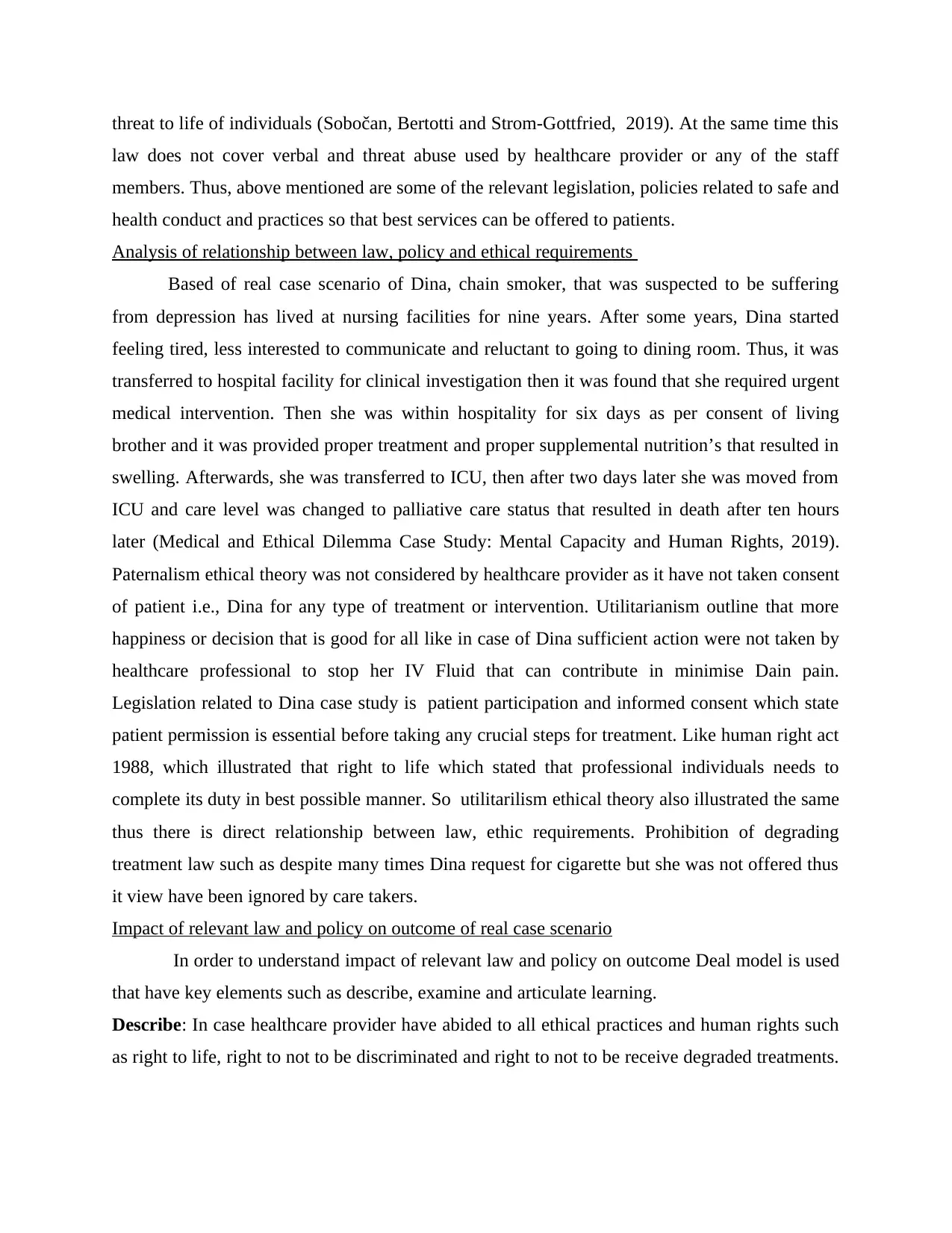
threat to life of individuals (Sobočan, Bertotti and Strom-Gottfried, 2019). At the same time this
law does not cover verbal and threat abuse used by healthcare provider or any of the staff
members. Thus, above mentioned are some of the relevant legislation, policies related to safe and
health conduct and practices so that best services can be offered to patients.
Analysis of relationship between law, policy and ethical requirements
Based of real case scenario of Dina, chain smoker, that was suspected to be suffering
from depression has lived at nursing facilities for nine years. After some years, Dina started
feeling tired, less interested to communicate and reluctant to going to dining room. Thus, it was
transferred to hospital facility for clinical investigation then it was found that she required urgent
medical intervention. Then she was within hospitality for six days as per consent of living
brother and it was provided proper treatment and proper supplemental nutrition’s that resulted in
swelling. Afterwards, she was transferred to ICU, then after two days later she was moved from
ICU and care level was changed to palliative care status that resulted in death after ten hours
later (Medical and Ethical Dilemma Case Study: Mental Capacity and Human Rights, 2019).
Paternalism ethical theory was not considered by healthcare provider as it have not taken consent
of patient i.e., Dina for any type of treatment or intervention. Utilitarianism outline that more
happiness or decision that is good for all like in case of Dina sufficient action were not taken by
healthcare professional to stop her IV Fluid that can contribute in minimise Dain pain.
Legislation related to Dina case study is patient participation and informed consent which state
patient permission is essential before taking any crucial steps for treatment. Like human right act
1988, which illustrated that right to life which stated that professional individuals needs to
complete its duty in best possible manner. So utilitarilism ethical theory also illustrated the same
thus there is direct relationship between law, ethic requirements. Prohibition of degrading
treatment law such as despite many times Dina request for cigarette but she was not offered thus
it view have been ignored by care takers.
Impact of relevant law and policy on outcome of real case scenario
In order to understand impact of relevant law and policy on outcome Deal model is used
that have key elements such as describe, examine and articulate learning.
Describe: In case healthcare provider have abided to all ethical practices and human rights such
as right to life, right to not to be discriminated and right to not to be receive degraded treatments.
law does not cover verbal and threat abuse used by healthcare provider or any of the staff
members. Thus, above mentioned are some of the relevant legislation, policies related to safe and
health conduct and practices so that best services can be offered to patients.
Analysis of relationship between law, policy and ethical requirements
Based of real case scenario of Dina, chain smoker, that was suspected to be suffering
from depression has lived at nursing facilities for nine years. After some years, Dina started
feeling tired, less interested to communicate and reluctant to going to dining room. Thus, it was
transferred to hospital facility for clinical investigation then it was found that she required urgent
medical intervention. Then she was within hospitality for six days as per consent of living
brother and it was provided proper treatment and proper supplemental nutrition’s that resulted in
swelling. Afterwards, she was transferred to ICU, then after two days later she was moved from
ICU and care level was changed to palliative care status that resulted in death after ten hours
later (Medical and Ethical Dilemma Case Study: Mental Capacity and Human Rights, 2019).
Paternalism ethical theory was not considered by healthcare provider as it have not taken consent
of patient i.e., Dina for any type of treatment or intervention. Utilitarianism outline that more
happiness or decision that is good for all like in case of Dina sufficient action were not taken by
healthcare professional to stop her IV Fluid that can contribute in minimise Dain pain.
Legislation related to Dina case study is patient participation and informed consent which state
patient permission is essential before taking any crucial steps for treatment. Like human right act
1988, which illustrated that right to life which stated that professional individuals needs to
complete its duty in best possible manner. So utilitarilism ethical theory also illustrated the same
thus there is direct relationship between law, ethic requirements. Prohibition of degrading
treatment law such as despite many times Dina request for cigarette but she was not offered thus
it view have been ignored by care takers.
Impact of relevant law and policy on outcome of real case scenario
In order to understand impact of relevant law and policy on outcome Deal model is used
that have key elements such as describe, examine and articulate learning.
Describe: In case healthcare provider have abided to all ethical practices and human rights such
as right to life, right to not to be discriminated and right to not to be receive degraded treatments.
⊘ This is a preview!⊘
Do you want full access?
Subscribe today to unlock all pages.

Trusted by 1+ million students worldwide
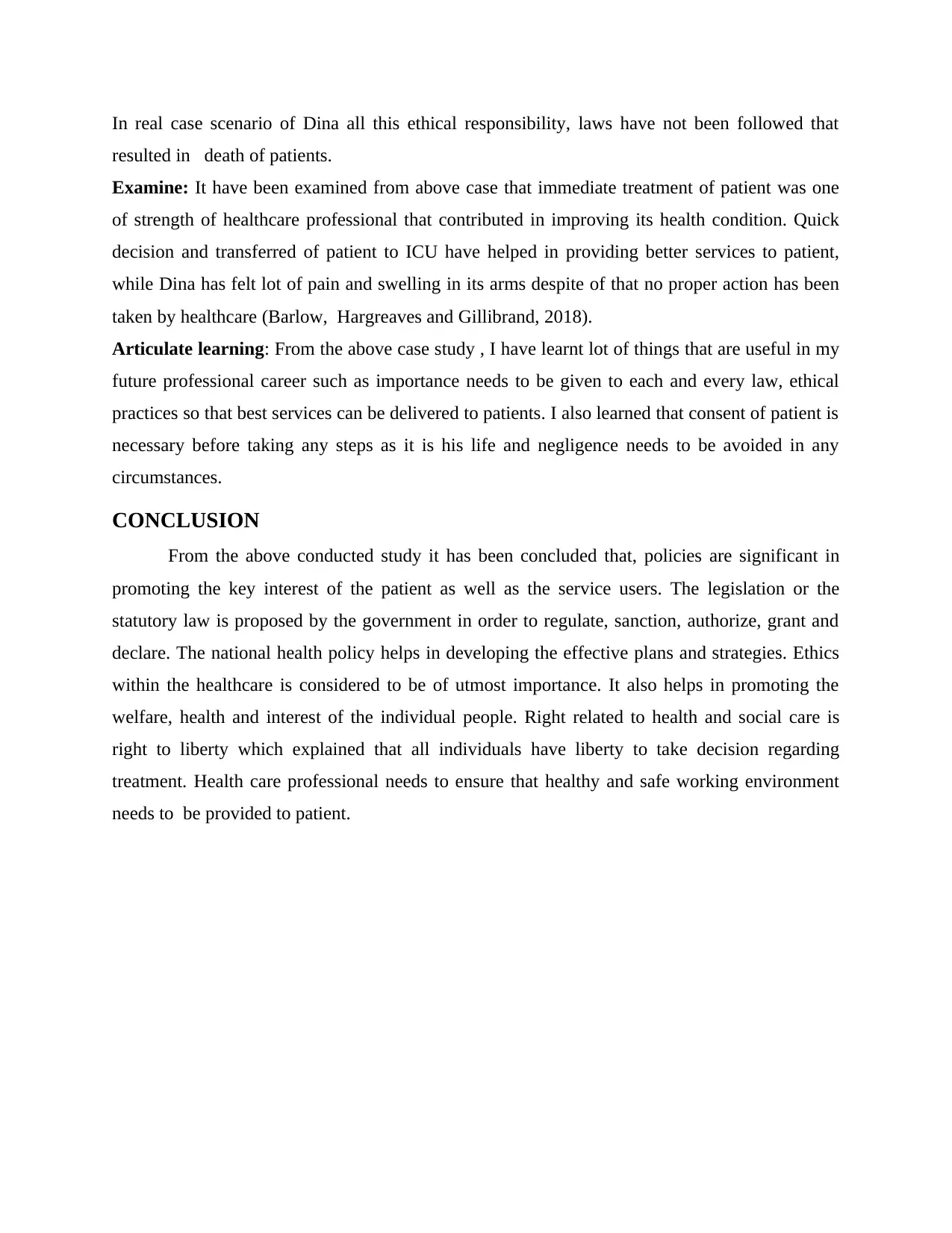
In real case scenario of Dina all this ethical responsibility, laws have not been followed that
resulted in death of patients.
Examine: It have been examined from above case that immediate treatment of patient was one
of strength of healthcare professional that contributed in improving its health condition. Quick
decision and transferred of patient to ICU have helped in providing better services to patient,
while Dina has felt lot of pain and swelling in its arms despite of that no proper action has been
taken by healthcare (Barlow, Hargreaves and Gillibrand, 2018).
Articulate learning: From the above case study , I have learnt lot of things that are useful in my
future professional career such as importance needs to be given to each and every law, ethical
practices so that best services can be delivered to patients. I also learned that consent of patient is
necessary before taking any steps as it is his life and negligence needs to be avoided in any
circumstances.
CONCLUSION
From the above conducted study it has been concluded that, policies are significant in
promoting the key interest of the patient as well as the service users. The legislation or the
statutory law is proposed by the government in order to regulate, sanction, authorize, grant and
declare. The national health policy helps in developing the effective plans and strategies. Ethics
within the healthcare is considered to be of utmost importance. It also helps in promoting the
welfare, health and interest of the individual people. Right related to health and social care is
right to liberty which explained that all individuals have liberty to take decision regarding
treatment. Health care professional needs to ensure that healthy and safe working environment
needs to be provided to patient.
resulted in death of patients.
Examine: It have been examined from above case that immediate treatment of patient was one
of strength of healthcare professional that contributed in improving its health condition. Quick
decision and transferred of patient to ICU have helped in providing better services to patient,
while Dina has felt lot of pain and swelling in its arms despite of that no proper action has been
taken by healthcare (Barlow, Hargreaves and Gillibrand, 2018).
Articulate learning: From the above case study , I have learnt lot of things that are useful in my
future professional career such as importance needs to be given to each and every law, ethical
practices so that best services can be delivered to patients. I also learned that consent of patient is
necessary before taking any steps as it is his life and negligence needs to be avoided in any
circumstances.
CONCLUSION
From the above conducted study it has been concluded that, policies are significant in
promoting the key interest of the patient as well as the service users. The legislation or the
statutory law is proposed by the government in order to regulate, sanction, authorize, grant and
declare. The national health policy helps in developing the effective plans and strategies. Ethics
within the healthcare is considered to be of utmost importance. It also helps in promoting the
welfare, health and interest of the individual people. Right related to health and social care is
right to liberty which explained that all individuals have liberty to take decision regarding
treatment. Health care professional needs to ensure that healthy and safe working environment
needs to be provided to patient.
Paraphrase This Document
Need a fresh take? Get an instant paraphrase of this document with our AI Paraphraser
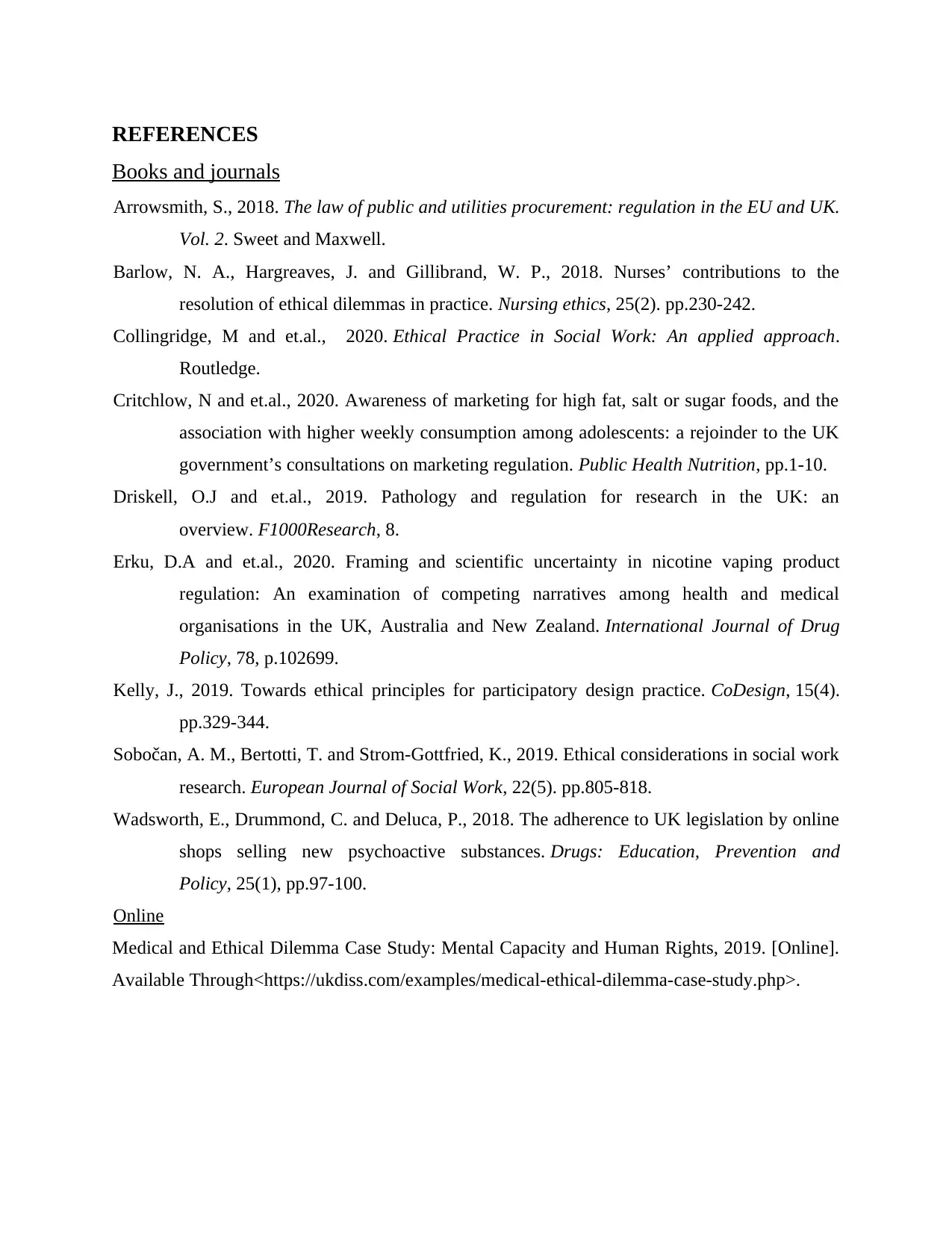
REFERENCES
Books and journals
Arrowsmith, S., 2018. The law of public and utilities procurement: regulation in the EU and UK.
Vol. 2. Sweet and Maxwell.
Barlow, N. A., Hargreaves, J. and Gillibrand, W. P., 2018. Nurses’ contributions to the
resolution of ethical dilemmas in practice. Nursing ethics, 25(2). pp.230-242.
Collingridge, M and et.al., 2020. Ethical Practice in Social Work: An applied approach.
Routledge.
Critchlow, N and et.al., 2020. Awareness of marketing for high fat, salt or sugar foods, and the
association with higher weekly consumption among adolescents: a rejoinder to the UK
government’s consultations on marketing regulation. Public Health Nutrition, pp.1-10.
Driskell, O.J and et.al., 2019. Pathology and regulation for research in the UK: an
overview. F1000Research, 8.
Erku, D.A and et.al., 2020. Framing and scientific uncertainty in nicotine vaping product
regulation: An examination of competing narratives among health and medical
organisations in the UK, Australia and New Zealand. International Journal of Drug
Policy, 78, p.102699.
Kelly, J., 2019. Towards ethical principles for participatory design practice. CoDesign, 15(4).
pp.329-344.
Sobočan, A. M., Bertotti, T. and Strom-Gottfried, K., 2019. Ethical considerations in social work
research. European Journal of Social Work, 22(5). pp.805-818.
Wadsworth, E., Drummond, C. and Deluca, P., 2018. The adherence to UK legislation by online
shops selling new psychoactive substances. Drugs: Education, Prevention and
Policy, 25(1), pp.97-100.
Online
Medical and Ethical Dilemma Case Study: Mental Capacity and Human Rights, 2019. [Online].
Available Through<https://ukdiss.com/examples/medical-ethical-dilemma-case-study.php>.
Books and journals
Arrowsmith, S., 2018. The law of public and utilities procurement: regulation in the EU and UK.
Vol. 2. Sweet and Maxwell.
Barlow, N. A., Hargreaves, J. and Gillibrand, W. P., 2018. Nurses’ contributions to the
resolution of ethical dilemmas in practice. Nursing ethics, 25(2). pp.230-242.
Collingridge, M and et.al., 2020. Ethical Practice in Social Work: An applied approach.
Routledge.
Critchlow, N and et.al., 2020. Awareness of marketing for high fat, salt or sugar foods, and the
association with higher weekly consumption among adolescents: a rejoinder to the UK
government’s consultations on marketing regulation. Public Health Nutrition, pp.1-10.
Driskell, O.J and et.al., 2019. Pathology and regulation for research in the UK: an
overview. F1000Research, 8.
Erku, D.A and et.al., 2020. Framing and scientific uncertainty in nicotine vaping product
regulation: An examination of competing narratives among health and medical
organisations in the UK, Australia and New Zealand. International Journal of Drug
Policy, 78, p.102699.
Kelly, J., 2019. Towards ethical principles for participatory design practice. CoDesign, 15(4).
pp.329-344.
Sobočan, A. M., Bertotti, T. and Strom-Gottfried, K., 2019. Ethical considerations in social work
research. European Journal of Social Work, 22(5). pp.805-818.
Wadsworth, E., Drummond, C. and Deluca, P., 2018. The adherence to UK legislation by online
shops selling new psychoactive substances. Drugs: Education, Prevention and
Policy, 25(1), pp.97-100.
Online
Medical and Ethical Dilemma Case Study: Mental Capacity and Human Rights, 2019. [Online].
Available Through<https://ukdiss.com/examples/medical-ethical-dilemma-case-study.php>.

⊘ This is a preview!⊘
Do you want full access?
Subscribe today to unlock all pages.

Trusted by 1+ million students worldwide
1 out of 12
Related Documents
Your All-in-One AI-Powered Toolkit for Academic Success.
+13062052269
info@desklib.com
Available 24*7 on WhatsApp / Email
![[object Object]](/_next/static/media/star-bottom.7253800d.svg)
Unlock your academic potential
Copyright © 2020–2025 A2Z Services. All Rights Reserved. Developed and managed by ZUCOL.





